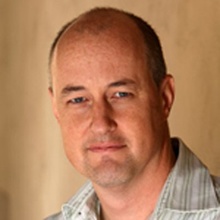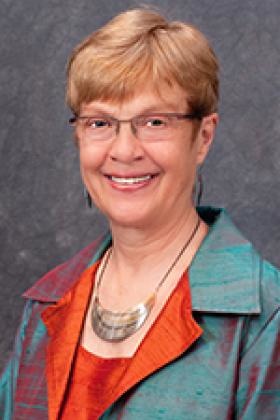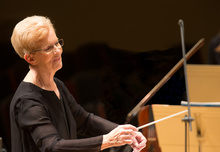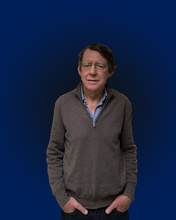Main navigation
The Alumni Fellows program, established in 1999, formally recognizes College of Liberal Arts and Sciences graduates or former students for their outstanding contributions to society, their professions, the college, and the University of Iowa. The program is made possible by funds from the UI Alumni Association Dean’s Chair in the Liberal Arts and Sciences.
Each year, several CLAS alumni—nominated by the CLAS departments in which they studied—are honored as Alumni Fellows. They are invited to campus for a two- to three-day visit. Each Fellow visits their home department to speak to classes, meets socially with small groups of faculty and students, and makes a public presentation based on their experiences since graduating from the university.
Nomination information
CLAS faculty members, through their DEOs, nominate potential Alumni Fellows and submit it to the Dean's Office where it will be considered by the collegiate leadership.
Additional alumni awards
Alumni fellow spotlights

Lessons from late night producer Eric Leiderman, 2025 CLAS Alumni Fellow

Late Night producer and 2025 CLAS alumni fellow carves out unconventional career path

Music, political science graduates selected as 2024 CLAS Alumni Fellows
Past award recipients
2025
Eric Leiderman
BA, Communication Studies, '99

Upon graduating, Eric pursued both his passions of music and comedy simultaneously, hoping to balance living in both worlds professionally.
He formed his own original bands and navigated the NYC and LA rock scenes; ultimately landing a drumming gig with Pearl Aday and Scott Ian, touring the US and as direct support for Velvet Revolver and Meat Loaf in the UK and Europe.
On the comedy front, he began his career at The Daily Show and Ellen, later adding senior credits with Borat and The Showbiz Show with David Spade among others. Leiderman produced or wrote for numerous shows in Los Angeles for 14 years before coming back to New York to run Impractical Jokers in 2013.
Leiderman has co-run NBC's Late Night with Seth Meyers as Producer since the show's 2014 debut, overseeing multiple departments on a creative and managerial level. Additionally, he managed The 8G Band (led by Fred Armisen) and created the weekly rotating drummer program where he booked over 250 of the best musicians in the world.
2024
Theodore “Teddy” Van Winkle
BM, Music, '22

The School of Music’s Teddy Van Winkle graduated with a Bachelor of Music from CLAS in 2020. After graduation, he joined the U.S. Air Force Band of the West at Travis Air Force Base in Vacaville, California, where he has performed for several high-profile events including world leaders like President Joe Biden and Canadian Prime Minister Justin Trudeau as well as performing at half-time for the NFL’s San Francisco 49ers. He also serves as the U.S. Air Force Band’s photographer, videographer, and tour manager for the band’s rock group.
David Conn
- BA, Political Science, '75
- MA, Political Science, '78
- JD, College of Law, '78

Conn, a lifelong Hawkeye, earned undergraduate and graduate degrees in political science in 1975 and 1978 from CLAS and his law degree from the University of Iowa College of Law. Conn has spent his career studying technology policy and government relations including at several large technology companies including T-Mobile, where he led policy and advocacy efforts. Conn has remained close to the university and the Department of Political Science, where he is the president of the department’s alumni advisory board.
Conn also has returned to campus to teach a one-week course about intersectionality in government policy and technology. Throughout his career, Conn has met with undergraduates and has been a mentor to students seeking a career in government relations.
2023
Elizabeth Summy
BA, Political Science, '86
Samuel D. Hunter
MFA, Playwriting, '07
2019
Amanda Acevedo
BS, Physics and Computer Science, '96

Amanda Acevedo is President of VEDO Systems, a software engineering and consulting firm in Houston, Texas. With over 20 years of experience, Ms. Acevedo has worked on development projects, served as a technical leader and managed cross program integration efforts. Her experience spans from Argonne National Lab where she developed control system software for the ATLAS accelerator, to NASA/Johnson Space Center where she worked Space Shuttle, X38, AERCam and Orion programs, through Intuitive Machines, an engineering think tank, where she developed software and led projects in the aerospace, energy, and medical sectors. Now she leads a team meeting the software needs of both small and large organizations across the country.
John Eiler
BS, Geology, '89

John Eiler is the Robert P. Sharp Professor of Geology and Geochemistry at the California Institute of Technology. He is a geologist and geochemist specializing in the distribution of the stable isotopes among natural materials. His research group is best known for developing the study of natural molecules containing two or more rare isotopes — a rare but ubiquitous family of species that give rise to a variety of applied geochemical tools. Dr. Eiler received his PhD in Geology from the University of Wisconsin, Madison. He then worked as a postdoctoral fellow in stable isotope geochemistry at Caltech, where he joined the faculty in 1994. Dr. Eiler is a member of the National Academy of Sciences and a recipient of the Day medal, Epstein medal, Macelwane medal, and Mineralogical Society of America young scientist award.
Scott Icenogle
BA, Communication Studies, '91

Scott Icenogle is the Music Composer for the television shows "Will & Grace" (NBC) and "The History of Comedy" (CNN). While a student, Mr. Icenogle spent a great deal of time in the School of Music as the Hawkeye Marching Band was a passion for him. After graduating, he moved to New York City and worked for ABC Television. He worked his way up the ladder over the course of a decade and eventually transferred to LA. He never gave up his interest in music, however, and started to mix and compose music during his spare time. He gradually had a number of pieces purchased and eventually became a DJ at clubs. When Mr. Icenogle was hired as a DJ for the Ellen DeGeneres Show, he was able to fully pursue music composition and left ABC. He now composes for television full time. He is known for his work on "Will & Grace," "The History of Comedy," and "Lazy Susan." In 2018, he and his husband, actor Sean Hayes, published a Nutcracker-inspired Christmas book for children, titled Plum, which was published by Simon and Schuster.
Carolyn Lukensmeyer
BA, English, '67

Carolyn J. Lukensmeyer is the Executive Director Emerita of the National Institute for Civil Discourse at the University of Arizona, an organization that works to reduce political dysfunction and incivility in our political system. As a leader in the field of deliberative democracy, she works to restore our democracy to reflect the intended vision of our founding fathers. Dr. Lukensmeyer previously served as Founder and President of AmericaSpeaks, an award-winning nonprofit organization that promoted nonpartisan initiatives to engage citizens and leaders through the development of innovative public policy tools and strategies. During her tenure, AmericaSpeaks engaged more than 200,000 people and hosted events across all 50 states and throughout the world. Dr. Lukensmeyer formerly served as Consultant to the White House Chief of Staff from 1993-94 and on the National Performance Review, where she steered internal management and oversaw government-wide reforms. She was the Chief of Staff to Ohio Governor Richard F. Celeste from 1986-91, becoming the first woman to serve in this capacity. She earned her PhD in Organizational Behavior from Case Western Reserve University and has completed postgraduate training at the Gestalt Institute of Cleveland, Ohio.
2018
Joseph Gaylord
BA, Speech and Dramatic Arts, ’67

Joe Gaylord is among the nation’s most experienced political consultants, having served as executive director of the National Republican Congressional Committee and senior counselor to House Speaker Newt Gingrich. He is an adjunct professor in the Department of Political Science and president of the Political Science Alumni Advisory Board.
Ann Howard Jones
BM ‘64, MM ‘66, DMA ’84

Ann Howard Jones is a retired Professor of Music and Director of Choral Activities at Boston University, where she was responsible for the highly regarded graduate program in choral conducting. Widely recognized for her conducting, leadership, and teaching, she received the Robert Shaw Choral Award from the American Choral Directors Association (2011) for distinguished professional accomplishment and service, and the Metcalf award from Boston University, which acknowledges exemplary teaching. She was Assistant Conductor to Choruses, including the Atlanta Symphony choruses, under the iconic Maestro Robert Shaw.
Charles Ray
BFA, Sculpture, '75

Charles Ray is an American artist celebrated for his sculptures of altered and refashioned familiar objects. He has had solo museum exhibitions at the Art Institute of Chicago (2015), Kunstmuseum Basel (2014), Astrup Fearnley Museet for Moderne Kunst, Oslo (2006), and the Whitney Museum of American Art, New York (1998). His work has been included in Documenta IX (1992), three iterations of the Venice Biennial (1993, 2003, 2013), and five installments of the Whitney Biennial (1989, 1993, 1995, 1997, 2010).
2017
Dawn Ainger
Chairman and CEO, Genova Technologies
BS 1992, MS, 1995
Department of Computer Science
Mary Bennett
Special Collections Coordinator, State Historical Society of Iowa
BA 1976, MA 1985
Department of History
David Conley
Executive Visual Effects Producer at Weta Digital
BA 1970
Department of Cinematic Arts
2016
James L. Green
Director, Planetary Science Division, NASA
BA 1973, PhD 1979
Department of Physics & Astronomy
Mark S. Milosch
Chief of Staff, Commission on Security and Cooperation in Europe
PhD 2002
Department of History
Thomas J. Wickham, Jr.
Parliamentarian, U.S. House of Representatives
BA 1990, Political Science; JD 1994
2015
Bob Bowlsby
Commissioner, Big 12 Conference
MA 1978
Recreation Education, Department of Health & Human Physiology
David Lang
Pulitzer Prize-winning composer
MM 1980
Composition, School of Music
Leslie Yazel
Executive Editor, Cosmopolitan
BA 1993
Journalism & Mass Communication, English
2014
Hope Edelman
MA 1992
Nonfiction Writing Program, Department of English
Bruce Gronbeck
MA 1965, PhD 1970
Communication Studies
Shelley Minteer
PhD 2000
Chemistry
Timothy J. Pounds
BA 1986
History and Political Science
Corinna Zarek
BA 2001
Journalism and Mass Communication; Political Science
2013
Rick Cleveland
MFA 1995
Theatre Arts
John Falsey
MFA 1978
Iowa Writers’ Workshop
Simone Ferro
MFA 2000
Dance
Howard Kerr
BA 1960
Political Science
Stamatios “Tom” Krimigis
MS 1963, PhD 1965
Physics & Astronomy
Lewis Lipsitt
PhD 1957
Psychology
J. Paul Oetken
BA 1988
Philosophy
2012
Jacques Bourgeacq
PhD 1972
French & Italian
Lois Braverman
MSW 1976
Social Work
Katharine Goeldner
BM 1985
Music
James Hill
PhD 1976
American Civilization/African American Studies
Mark Mattson
PhD 1986
Biology
Larry Snyder
BA 1968
Mathematics and Economics
2011
Avijit Ghosh
PhD 1979
MA 1977
Geography
Erik Ulfers
BA 1975
MFA candidate
Theatre
Riva Castleman
BA 1951
Art History
Leon Aden
BS 1980
MS 1982
Geology
David Bonior
BA 1967
Political Science
2010
Sam Becker
BA 1947
MA 1949
PhD 1953
Communication & Theatre
Solomon Bililign
PhD 1991
Physics
Scott Dunn
BM 1975
Music
Eric Rabkin
PhD 1970
English
Fred W. Raths
MS 1952
PhD 1954
Chemistry
2009
N. Peggy Burke
PhD 1965
Physical Education
Don L. Davis
PhD 2000
Religious Studies
Stephen V. Faraone
PhD 1982
Clinical Psychology
Martha Ann Selby
BA 1982
Asian Studies
Michael Tanenhaus
BS 1973
Speech and Hearing Science
2008
Susan Gubar
PhD 1972
English
Elizabeth A. Mathis
MA 1980
Communication and Theatre Arts
Journalism
Chester M. McCloskey
MS 1942
PhD 1944
Chemistry
L. Nathan Oaklander
BA 1967
MA 1970
PhD 1973
Philosophy
John E. Osborn
BA 1979
Economics
History
Lloyd H. Rogler
BA 1951
Philosophy
MA 1952
PhD 1957
Sociology
2007
Carol A. Dahl
Foundation Executive
BA 1969
Biology
Robert V. Hogg
Founding Chair of Statistics and Actuarial Science
M.S. 1948, PhD 1950
Mathematics
Mark M. Johnson
Prolific Producer
MA 1973
Communication and Theatre Arts
Scott J. McHoy
Professor of Voice and Pedagogy
BM 1976, MA 1977
MFA 1983, DMA 1987
School of Music, Division of Performing Arts
Clyde D. Stoltenberg
Expert in the Law and Economics of Asia
BA 1969
Classics
2006
Elizabeth Catlett
Celebrated American Artist
MFA 1940
School of Art and Art History
Earl E. Fitz
Influential Scholar of Literatures of Latin America
BA 1968, MA1970
Department of Spanish and Portuguese
Journalism
Aquiles Iglesias
Expert in the Field of Speech Pathology and Multicultural Education
PhD 1978
Department of Speech Pathology and Audiology
Marsha A. Martin
Senior Deputy Director, District of Columbia Department of Health
BA 1974, Department of Psychology
MSW 1975, School of Social Work
Carol E. Oukrop
Leading Scholar in Journalism and Mass Communication Education
MA 1965, PhD 1969
School of Journalism and Mass Communication
Thomas E. Romesser
Vice President of Technology Development, Northrup Grumman Space Technology
MS 1973, PhD 1974
Department of Physics and Astronomy
2005
James Thomas Glanz
Science Reporter and Author
BS 1979
Department of Physics
Frances Degen Horowitz
Renowned Developmental Psychologist
PhD 1959
Department of Child Behavior and Development
Stephen Hulme
Project Executive and Systems Architect
BA 1974, Department of Classics
BS 1980, Department of Computer Science
Shanto Iyengar
Outstanding Scholar of Contemporary Media and Politics
MA 1971, PhD 1972,
Department of Political Science
Trudy Huskamp Peterson
Distinguished Archivist
MA 1972, PhD 1975,
Department of History
Richard J. Schnieders
Chairman and CEO of SYSCO Corporation
BA 1970,
Department of Mathematics
2004
Leola N. Bergmann
Scholar & Printmaker
MA 1939, Department of English
PhD 1942, Department of American Studies
Mitchell A. Burgess
Television Producer & Writer
BA 1978, Department of History
Robin L. Green
Television Producer & Writer
MFA 1977, Department of English
Dorothy K. Ray
Radio Journalist
BA 1944, MA 1945, Department of Journalism and Mass Communication
Jerry M. Sudarsky
Radio Journalist Founder and Chairman of Alexandria Real Estate Equities
Attended the University of Iowa 1936-39
James L. Watson
John King and Wilma Cannon Fairbank Professor of Chinese Society, Harvard University
BA 1965, Department of Asian and Slavic Languages and Literature
2003
Albert Bandura
David Starr Jordan Professor of Social Science in Psychology, Stanford University
Department of Psychology
MA 1951, PhD 1952 Department of Psychology
Terry E. Branstad
President, Branstad and Associates LC
BA 1969
Department of Political Science
S.H. Bromberger
Consultant, Intellectual Property
MS 1965, PhD 1968
Department of Geoscience
Kenneth Klabunde
University Distinguished Professor of Chemistry, Kansas State University
PhD 1969
Department of Chemistry
Eric Sandeen
Professor and Director of the American Studies Program, University of Wyoming
MA 1976, PhD 1977
Department of American Studies
Ellen Weissinger
Executive Associate Dean of Graduate Studies, University of Nebraska–Lincoln
MA 1982
Department of Leisure Studies
2002
Lawrence Bryant
Professor of History, California State University, Chico
MA 1968, PhD 1978
Department of History
Roderick Kiewiet
Professor of Political Science, California Institute of Technology
BA 1974
Department of Political Science
Ellen Lanyon
Painter and Printmaker
MFA 1950
School of Art & Art History
Robert McGrath
Provost, State University of New York at Stony Brook
MS 1962, PhD 1965
Department of Physics and Astronomy
Beatrice Mintz
The Jack Schultz Endowed Professor, The Fox Chase Cancer Center
MS 1944, PhD 1946
Department of Biological Sciences
Kyle Zimmer
President, First Book
BA 1982
Department of English
2001
Jane Kelleher Fernandes
Provost, Gallaudet University
MA 1980, PhD 1986
Department of Cinema & Comparative Literature
James Gibson
Sidney W. Souers Professor of Government, Washington University
MA 1973, PhD 1975
Department of Political Science
Reginald Golledge
Professor of Geography, University of California, Santa Barbara
PhD 1966
Department of Geography
Robert J. Myers
Fellow, Society of Actuaries and the Casualty Actuarial Society
MA 1934
Department of Statistics & Actuarial Science
Marcia Radosevich
Consultant, Health Care Entrepreneurship Program at Boston University's Health Policy Institute
MA 1978, PhD 1982
Department of Sociology
D.C. Spriestersbach
Professor Emeritus, Speech Pathology and Audiology/Otolaryngology, University of Iowa
MA 1940, PhD 1948
Department of Speech Pathology & Audiology
2000
Mildred Wirt Benson
Author and Journalist
BA 1925, MA 1927
School of Journalism & Mass Communication
Henderson Forsythe
Actor
BA 1939, MFA 1940
Department of Theatre Arts
Division of Performing Arts
Katherine Hammer
President and CEO, Evolutionary Technologies International
BA 1967, MA 1969, PhD 1973
Department of English, Department of Linguistics
James Hansen
Head of NASA's Goddard Institute of Space Studies
BA 1963, MS 1965, PhD 1967
Department of Physics & Astronomy
Marcus Milling
Executive Director, American Geological Institute
MS 1964, PhD 1968
Department of Geoscience
1999
Charles Dodge
Professor of Music, Dartmouth College
BA 1964
School of Music
Division of Performing Arts
Kevin Doyle
National Director of Program Development, ECO
BA 1980
Department of Geography
James Hickman
Emeritus Professor and Dean, School of Business, University of Wisconsin
MS 1952, PhD 1961
Department of Statistics & Actuarial Science
Mark Rosenthal
Curator, Menil Collection
MA 1971, PhD 1979
School of Art & Art History
Roger Thurow
Senior Writer, The Wall Street Journal
BA 1979
School of Journalism & Mass Communication and Department of Political Science
James Van Allen
Professor Emeritus, Department of Physics and Astronomy, University of Iowa
MS 1936, PhD 1939
Department of Physics & Astronomy